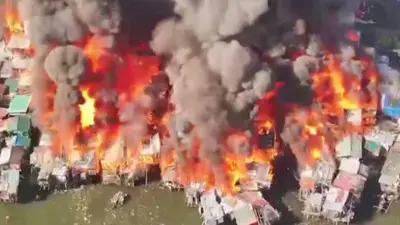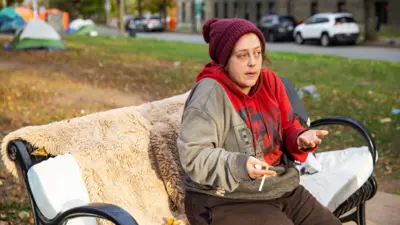We've updated our Privacy and Cookies Policy
We've made some important changes to our Privacy and Cookies Policy and we want you to know what this means for you and your data.
RSPB criticises Crown Office over dropped raptor case
- Author, Kevin Keane
- Role, ҙуПуҙ«ГҪ Scotland's rural affairs correspondent
Confidence in prosecutors' ability to convict for crimes against birds of prey is being significantly undermined, according to RSPB Scotland.
The charity has questioned the Crown Office's decision to drop the case against a gamekeeper accused of setting an illegal trap.
It has released footage which was due to be used in the trial purporting to show a "pole trap" being laid out.
The case against Craig Graham has been discontinued.
The gamekeeper, of Brewlands in Angus, was due to be tried next week.
It follows a decision to drop proceedings against another gamekeeper, Stanley Gordon, from Cabrach in Moray.
The Crown Office said video evidence provided by the RSPB in both cases was not admissible to the court because it was filmed for the purposes of gathering evidence.
The charity has insisted that was not the case and that the crimes were recorded accidently.
RSPB Scotland's lead investigator Ian Thomson told ҙуПуҙ«ГҪ Scotland: "What has happened over the last few weeks has undermined our confidence significantly in that we've had two cases discontinued with absolutely no explanation.
"It removes any opportunity for either ourselves or the police or anyone else who is engaged in tackling the scourge of raptor persecution to learn anything at all."
Image source, RSPB
Mr Thomson said the camera was deployed to help understand why birds were not surviving at the nest site.
He added: "We could have captured footage of a fox coming and eating the eggs or the chicks, or it might have failed due to bad weather. But instead what happened is an individual came and shot the female."
Birds of prey are a nuisance to land managers because they attack smaller birds, like grouse, which they are rearing for shooting.
But the law falls on the side of the raptors making it illegal for them to be disturbed or killed.
'Research purposes'
When it comes to video evidence, there appear to be discrepancies in what is allowed.
Video was used in court for the case against George Mutch who was jailed for killing two goshawks in Aberdeenshire.
The images were accidently captured from a camera which was monitoring a site for "research purposes".
Prof Peter Duff, from the University of Aberdeen's law school, said: "If it genuinely was incidental then they wouldn't have a problem with the evidence being admissible, but I think most of these operations may be partly for research purposes but they're also to protect wildlife and to deter wrong-doers."
The RSPB believes that prosecutors in the two most recent cases should have allowed the courts to decide whether the footage was admissible rather than pulling out of the prosecution.
'Covert surveillance'
Without the use of such pictures, they believe the chances of a conviction are low and that the birds become more vulnerable to persecution.
A Crown Office spokesman said: "Discussions have taken place over a number of years between RSPB and COPFS [Crown Office and Procurator Fiscal Service] about the admissibility of evidence obtained through the use of covert surveillance.
"The Crown has consistently made clear the limitations which the law places on the admissibility of evidence which has been obtained irregularly.
"The Crown is committed to the rigorous, fair and independent prosecution of crime, including wildlife and environmental crime. It has a specialist unit dedicated to the prosecution of wildlife and environmental crime, acting under the direction, as required, of a senior advocate depute.
But RSPB Scotland believes the Crown Office's position erodes confidence in its commitment to tackling wildlife crime.
Ian Thomson, of RSPB Scotland, added: "There have only ever been two convictions of individuals in Scotland for shooting hen harriers. Both of those individuals were captured on video, one shooting a bird and one attempting to shoot a bird.
"There's the answer."
Top Stories
More to explore
Most read
Content is not available








